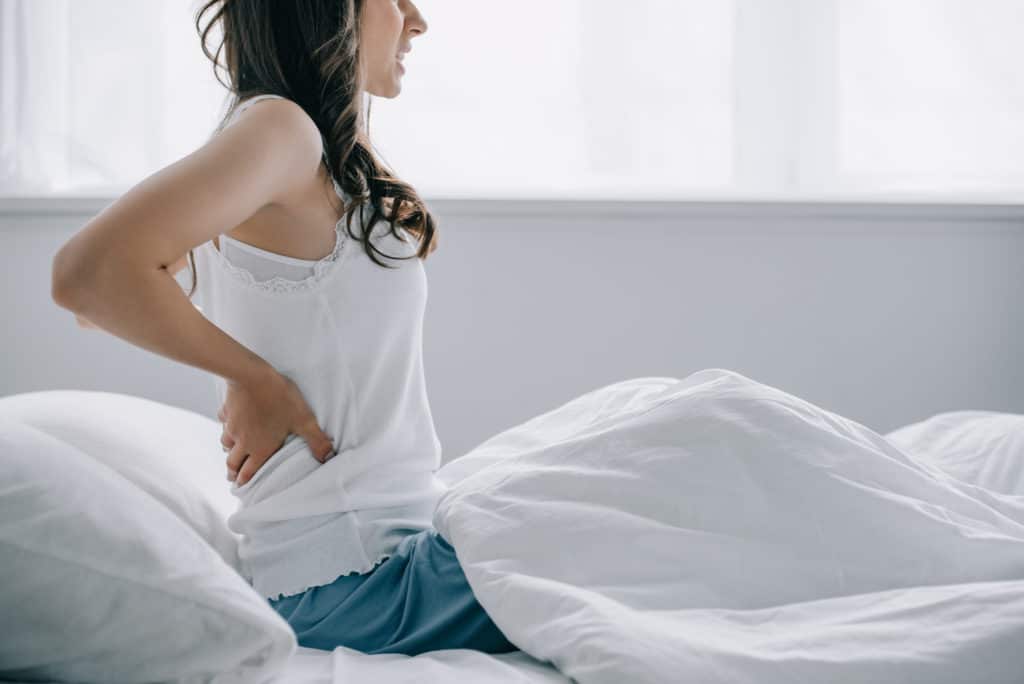
Do you wake up with pain every morning? Like it’s Groundhog Day, but with crippling discomfort?
We all want to get a good night’s rest and wake up every morning feeling well-rested and refreshed. That’s the dream, isn’t it? But unfortunately for lots of people, this is not the case – in fact, the opposite is true. Instead, they struggle with broken sleep, insomnia and wake up with aches and pains every damn day.
Does that sound like you?
There is nothing worse than a bad night’s sleep and we know that.
Find out in this article how we can help you manage your pain and regain your nights sleep.
More Blogs From Gage Physiotherapy
What Causes Knee Pain, And What Can I Do To Relieve It?
Why Do I Wake Up With Pain?

For you, it could be a stiff neck, lower back pain, sore knees, or mysteriously painful toes when your feet hit the floor first thing in the morning. But it doesn’t really matter where you feel the pain; the truth is waking up with pain (especially when it is every day) is miserable. But what causes it?
Well, it may surprise you to hear that in many cases, the pain (or worsening pain) you feel first thing in the morning could be due to your sleeping position. However, the good news is that if that is the cause of your AM pain, there are lots of things we can do to fix it and help you get a restful night’s sleep and start waking up pain-free.
There are various reasons why you might have aches and pains. It could be due to inflammation, aging, too little exercise, injuries, or a medical condition. But a poor sleeping position can exacerbate things and worsen pain in the mornings.
How Can I Stop Waking Up With Pain?

You can take many steps to prevent waking up in the morning with worsening pain, from changing your sleeping position and stretching to not eating or drinking within 2 hours of going to bed. All these things can make a remarkable difference in the quality of your sleep and reduce morning pain levels.
Here are some of the best sleeping positions to reduce morning pain levels:
- Sleeping on a side: This sleeping position enables your neck to align with the rest of your body and spine correctly. However, using too stiff or soft pillows/mattresses can be counterproductive when you sleep on your side. Instead, choose a pillow suited to your neck that conforms to its shape while aligning the neck and head between the shoulders. In addition, you can place a pillow below your waist or between your knees to relieve pressure on vital parts of the body and reduce the potential for AM pain.
- Sleeping on the back: Not many people do this naturally – it takes some training. But the ideal way to prevent aches and pain the following day is to sleep on your back. If you suffer from back or neck pain, we recommend that you sleep on your back as much as possible to reduce pressure on painful areas. But make sure you use a firm pillow that fits the natural contours of your neck and spine and keeps the rest of your body in the correct line of alignment.
- On the back with knee support and pillow adjustment: Sleeping on your back is the best position for you if you get up with aches and pains. But not everyone finds it comfortable right away. You can solve this problem and maintain even weight distribution across your body by using a pillow that fits under your neck and aligns your back curve naturally. In addition, you can add pillows to relieve pressure and provide additional support to the knees and beneath your lower back. This extra support should considerably help you get a good night’s sleep while sleeping on your back.
- Sleeping in the “Fetal position”: This “curled up” position is one of the most common sleeping positions. Your body is curled up like a baby in the womb in the fetal position. When you do this, your neck is also curved forwards, which can cause issues for some people. If you like to sleep in this position but want to avoid pain – you can stretch your arms out front. This extra step prevents neck pain and keeps the upper body straight. Unsurprisingly, it is a great sleeping position for pregnant women, too – because it improves blood circulation to the fetus while relieving pressure on the lower/ upper back and neck.
- Sleeping on the side + legs + knee support: Finally, if you have neck pain and pain in the lower back and wake up every morning with soreness and back pain. You may find sleeping on your side very beneficial. Pulling your knees inwards to your chest in this position will help to relieve stress on your spinal cord and lower back. In addition, the benefit of adding a pillow (not too firm or too soft) between the knees will ease pressure on the nerves of the back. It is a very comfortable position for a restful night’s sleep and does not exert stress on any body part.
What Else Can I Do To Avoid Waking Up In Pain?

To enjoy a relaxed sleep and get up feeling fresh and reenergized the following day doesn’t just come down to your sleeping position. Other external factors can affect the quality and quantity of your sleep.
Here are our top suggestions for sleeping aids and how you can improve your sleeping environment to get a better night’s sleep:
- Choice of mattress: Selecting the correct type of mattress for your needs is possibly the most essential aid to getting a better night’s sleep and waking up with less pain. An ideal choice for your mattress is one that is neither too firm nor too soft but just perfect – adapting to the natural contours of your spine and relieving pressure on the stress points.
- Use of pillows: Pillows are an invaluable sleeping aid to help you get a good night’s rest and avoid waking up with pain. They help relieve pressure and prevent pain in the critical joints of the body when you place them correctly. To provide additional support to your neck and lower back, you can strategically place pillows beneath and between your knee and below your neck and lower back.
- Avoid sleeping on the stomach: One thing that you must avoid to prevent AM pain is sleeping “prone” face-down on your stomach. Apart from impacting the natural curvature of your spinal cord, this position also adds pressure on your back, neck and hips. Therefore, you should avoid sleeping in this position as much as you possibly can. Some of the risks associated with this sleeping position include straining your back, hurting your spine and suffering from a herniated disc.
- Create a sleep routine: Along with choosing a good position to sleep in and creating a peaceful environment in your bedroom. Choosing a fixed time to go to bed every day can be helpful. When you do this, you allow your body’s natural circadian rhythm to function as effectively as possible, which aids sleep.
- Lead a healthy lifestyle: The phrase “healthy lifestyle” is subjective and different for everyone. But eating a varied diet with lots of vitamins and minerals from fruits and vegetables and whole grains. Plus, exercising more regularly can help you sleep better at night and wake up feeling rested and ready to go.
- Avoid digital devices: The bright lights and brain stimulation that occurs after using digital devices right before bed can interfere with your sleep and prevent you from getting a good night’s sleep. Consider setting yourself a timer to switch them all off at the same time every night, at least an hour before you go to bed, to avoid sleep disruption.
How To Avoid Waking Up In Pain: In Summary

Not getting a good night’s rest is physically and mentally exhausting. But apart from the aches and pains, lack of good quality sleep can also lead to raised stress levels, irritation, and fatigue throughout the following day. In addition, it can wreak your relationships, affect your career, and have negative consequences for your long-term health.
The bottom line to better sleep is to adopt a sleeping position that is comfortable and prevents pain. One that allows you to get rejuvenated in the morning and ready for the day ahead. Make sure your sleeping environment is peaceful, quiet, and as dark as possible. Use the correct type of mattress and pillows that suit the natural curvature of your neck and spine. But also – if you suffer from chronic pain throughout the day and in the morning, consult with a physiotherapist who can help find the root cause and resolve the issue once and for all.
Click here to book a free consultation with one of our experienced physiotherapists.



